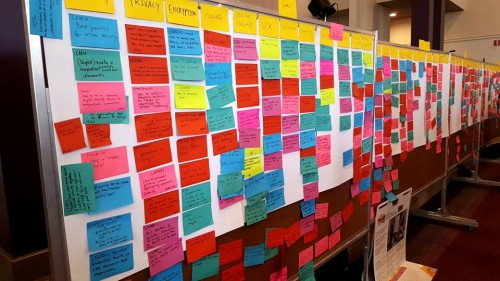[ed. note: Data @ IFRC is a blog series to share highlights from data-driven Red Cross Red Crescent national societies, learning opportunities and thought pieces on all things data from ethics to evidence.]

Data strategies for events
Brainstorming is a common concept but have you “Agenda Hacked“? This is a methodology of collecting and collaborating on topics that you want to discuss. This week I am at the Aspiration Non-Profit Software Development. The photo above shows how agendas can be community-driven. Once participants provide their input on what they would like to learn, share, and discuss, the team determines sessions to build out agenda based on the audience. Consider it real-time data collection for decision-making. How can we apply this facilitation method to connect with communities and each other?
Around the Movement
The Netherlands Red Cross initiative team (the 510) has published an article detailing their work using machine learning and predictive modeling.
About the project: “The Priority Index predicts the number of houses damaged per area in the region that is hit by Typhoon Haima. The model is a first attempt at building evidence on how to use data to predict priority areas for humanitarian aid within hours after a typhoon.”
The Red Cross Red Crescent Climate Change Center has a new virtual reality game: “puts users in the shoes of decision makers, letting them decide whether or not to ring an alarm bell, stamp papers for aid delivery, and load supplies into a relief truck – all from a virtual hill overlooking the green valley and the surging waters of the dam.”
The Canadian Red Cross has partnered with Aviva to do some work Missing Maps.
Alnap webinar: Data Quality
Data quality is always a factor when considering programs around the world. Our allies at Alnap are hosting a webinar to help you consider barriers and opportunities: “Flying blind: gathering and using quality information in situations of constrained access.”
Register for the webinar
How can Apache’s lessons help Humanitarians?
“The software is not defined by a temporary alliance of business leaders. “Business interest and strategies change and it is not good to be dependent on this.””
One of my big mandates at IFRC is to help guide various open data and open source initiatives. In the humanitarian space, this is a delicate navigation due to privacy and security concerns. The lessons of building community and sustainable collaboration are well-worn by leaders at large open source groups like Apache Foundation. Something to ponder as we navigate changes.
What about big data for Food?
This TED talk really nailed the crux of how research and humanitarians can collaborate. As well, Mallory Soldner (speaker) gave a reality check on when data scientists can actually be effective.
(Photo credit: Heather Leson, Aspiration Non-Profit Software Development Summit, November 2016)